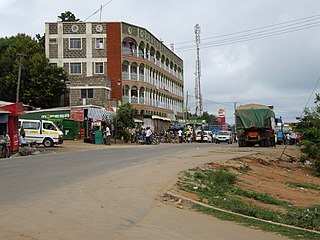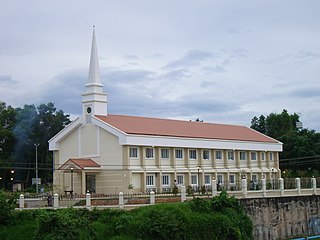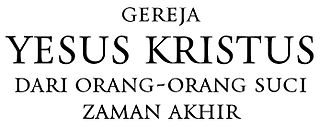Related Research Articles

The Church of Jesus Christ of Latter-day Saints, informally known as the LDS Church or Mormon Church, is a restorationist, nontrinitarian Christian denomination belonging to Mormonism. The church is headquartered in the United States in Salt Lake City, Utah and has established congregations and built temples worldwide. According to the church, it has over 17 million members and 62,544 full-time volunteer missionaries. Based on these numbers, the church is the fourth-largest Christian denomination in the United States as of 2012, and reported over 6.8 million US members as of 2022.

Latter-day Saint Charities is a branch of the welfare department of the Church of Jesus Christ of Latter-day Saints. The organization's stated mission is to relieve suffering, to foster self-reliance for people of all nationalities and religions, and to provide opportunities for service.

Missionaries of the Church of Jesus Christ of Latter-day Saints —widely known as Mormon missionaries—are volunteer representatives of the church who engage variously in proselytizing, church service, humanitarian aid, and community service. Missionaries of the LDS Church may be male or female and may serve on a full- or part-time basis, depending on the assignment. Missionaries are organized geographically into missions, which could be any one of the 411 missions organized worldwide. This is one of the practices that the LDS Church is well-known for.

Gulu is a city in the Northern Region of Uganda. It is the commercial and administrative centre of Gulu District.
![<span class="mw-page-title-main">Deseret Industries</span> Thrift store chain owned by the [[The Church of Jesus Christ of Latter-day Saints|LDS]] church](https://upload.wikimedia.org/wikipedia/en/thumb/8/87/Deseret_Industries_logo.svg/320px-Deseret_Industries_logo.svg.png)
Deseret Industries is a non-profit organization and a division of the welfare services provided by the Church of Jesus Christ of Latter-day Saints.

Kitui County is a county in the former Eastern Province of Kenya with its capital and largest town being Kitui, although Mwingi is also another major urban centre. The county has a population of 1,136,187. and an area of 30,496 km2. It lies between latitudes 0°10 South and 3°0 South and longitudes 37°50 East and 39°0 East.

Mwingi is a town in the Kitui County in the Eastern Region of the Republic of Kenya. It has an urban population of 15,970. The town is located along the A3 Road between Nairobi and Garissa, 47 kilometres (29 mi) north of its county capital Kitui, and 200 kilometres (120 mi) east of the capital city of Nairobi. It was the capital of the former Mwingi District.

The developing nations of Africa are popular locations for the application of renewable energy technology. Currently, many nations already have small-scale solar, wind, and geothermal devices in operation providing energy to urban and rural populations. These types of energy production are especially useful in remote locations because of the excessive cost of transporting electricity from large-scale power plants. The applications of renewable energy technology has the potential to alleviate many of the problems that face Africans every day, especially if done in a sustainable manner that prioritizes human rights.

Living Water International (LWI) is a faith-based non-profit organization that helps communities in developing countries to create sustainable water, sanitation and hygiene (WASH) programs in response to the global water crisis. It is based in Houston, Texas, United States. It was established in 1990 and currently operates in 17 countries. As of 2013, the organization had completed more than 14,100 water projects which included drilling new water wells, harvesting water, and the rehabilitation of non-working wells. Living Water was a founding member of the Millennium Water Alliance, and is a member of the 58 Alliance, a coalition of Christian organizations united to help eliminate extreme poverty.
Food for the Hungry is a Christian international relief, development, and advocacy organization. Food for the Hungry was founded in 1971 by Larry Ward. Food for the Hungry's stated mission for long-term development is to graduate communities of extreme poverty within 10–15 years. The organization also works in disaster relief and humanitarian response, including working with the Rohingya refugees in Bangladesh and Syrian refugees in Lebanon.
UNICEF, originally called the United Nations International Children's Emergency Fund in full, now officially United Nations Children's Fund, is an agency of the United Nations responsible for providing humanitarian and developmental aid to children worldwide. The agency is among the most widespread and recognizable social welfare organizations in the world, with a presence in 192 countries and territories. UNICEF's activities include providing immunizations and disease prevention, administering treatment for children and mothers with HIV, enhancing childhood and maternal nutrition, improving sanitation, promoting education, and providing emergency relief in response to disasters.

The Church of Jesus Christ of Latter-day Saints in Malaysia refers to the Church of Jesus Christ of Latter-day Saints and its members in Malaysia. In 2019 membership was nine times what it was in 1999 and number of congregations more than doubled during the same time period.

Water supply and sanitation in Kenya is characterised by low levels of access to water and sanitation, in particular in urban slums and in rural areas, as well as poor service quality in the form of intermittent water supply. Seasonal and regional water scarcity in Kenya exacerbates the difficulty to improve water supply.
The Africa Evangelical Presbyterian Church (AEPC) is a growing conservative Presbyterian and Reformed Church which adheres to the Westminster Confession of Faith started in Kenya, later spread to the surrounding countries like Burundi, Tanzania, Congo and as far as Zimbabwe. The headquarters of the church is located in Nairobi, Kenya. The current Moderator is Rev. Dr Joseph Mutei installed on Sunday 26th June 2022.

Welfare Square is a complex in downtown Salt Lake City, Utah owned and operated by the Church of Jesus Christ of Latter-day Saints, to provide material assistance to poor and otherwise needy individuals and families. Welfare Square is part of the Church's Church Welfare System. It includes a 178-foot (54 m) grain silo, fruit orchards, a milk-processing plant, a cannery, a bakery, a Deseret Industries thrift store, a private employment office, and the LDS Church's largest Bishop's storehouse, as well as associated administrative offices.

Philanthropies, formerly LDS Philanthropies, is a department of the Church of Jesus Christ of Latter-day Saints and is responsible for facilitating donations to humanitarian and educational initiatives. The department works under the direction of the church's Presiding Bishop. The most widely known educational projects are the operation of church-owned schools, such as Brigham Young University (BYU). Humanitarian funds are given to Latter-day Saint Charities which sponsors and organizes relief efforts. In 2019, the church reported over 3,000 community-based projects with an excess of 2,000 partners, in locations around the world. A 2020 statistic reported a total of $2.3 billion that had been donated over Philanthropies' existence.

The Church of Jesus Christ of Latter-day Saints in Indonesia refers to the Church of Jesus Christ of Latter-day Saints and its members in Indonesia. The first small branch was established in 1970. Since then, the LDS Church in Indonesia has grown to more than 7,500 members in 24 congregations.

The Church of Jesus Christ of Latter-day Saints in Mongolia refers to the Church of Jesus Christ of Latter-day Saints and its members in Mongolia. The first missionaries arrived in 1992 under request of the Mongolian government in effort to improve higher education in the country following the collapse of the Soviet Union. The first small branch was established in 1993. Since then, the LDS Church in Mongolia has grown to more than 12,000 members in 24 congregations. In 2022, Mongolia had the second most LDS Church members per capita in Asia behind the Philippines.

The Church of Jesus Christ of Latter-day Saints in Croatia refers to the Church of Jesus Christ of Latter-day Saints and its members in Croatia. The first missionaries arrived in Croatia in 1974. In 2022, there were 633 members in 6 congregations.
The Church of Jesus Christ of Latter-day Saints in Tanzania refers to the Church of Jesus Christ of Latter-day Saints and its members in Tanzania. The first branch was organized in 1992. In 2021, there were 2,999 members in 23 congregations.
References
- "Mormon Helping Hands Completes First Decade of Service". Ensign . LDS Church: 78. January 2009. Retrieved 6 June 2011.